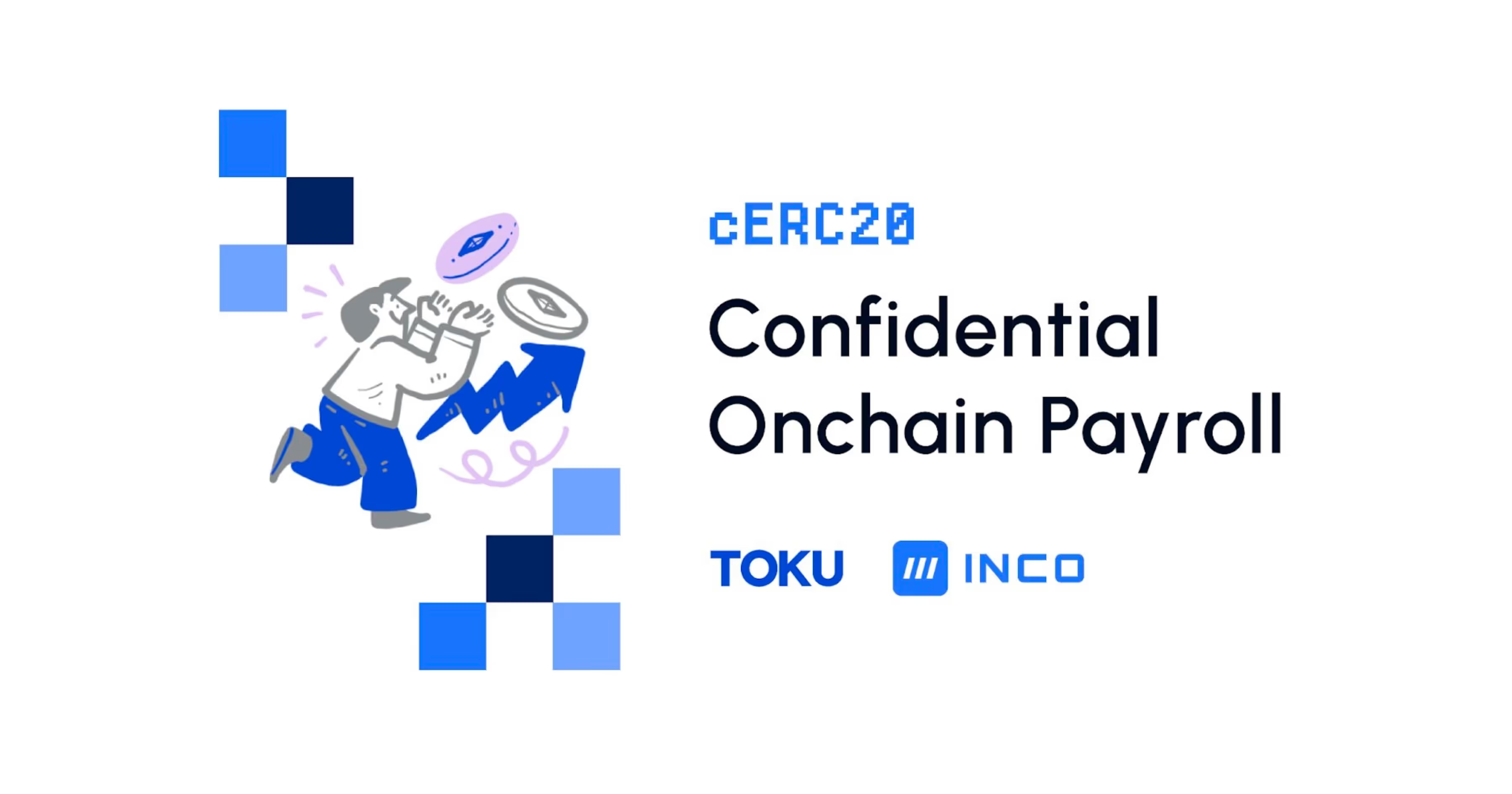
Inco and Toku Announce Confidential Stablecoin Payroll for W2 Employees
Confidential stablecoin payroll arrives. Inco and Toku enable encrypted onchain W2 payroll using cERC20 and FHE technology.

.avif)
Global payroll is one of the largest and most operationally complex financial systems on the planet—yet it remains one of the least modernized. Despite supporting 1.74 billion salaried workers and processing more than $48 trillion in annual wages, the infrastructure behind payroll still relies on dated rails, siloed systems, and jurisdiction-by-jurisdiction reconciliation processes that were not built for the speed, scale, or global distribution of today’s workforce.
According to Research and Markets, the global payroll market reached $99 billion in 2023 and is on track to hit $134 billion by 2028. Yet major inefficiencies persist because the foundational technology has barely evolved. Cross-border payments still move through layers of intermediaries. Companies must maintain dozens of local payroll providers, entity structures, and banking relationships. Employees often wait days for payments that should be instant in a digital-first world.
In this environment, the partnership between Inco and Toku introduces a new standard for payroll: encrypted, instantly settled, and globally compliant stablecoin payroll for W2 employees using the confidential ERC20 (cERC20) token format.
Why Global Payroll Hasn’t Modernized—Until Now
Payroll complexity stems from the fact that every country—and sometimes every province or state—has its own rules, tax structure, banking limitations, and data protection requirements. A multinational company must navigate:
- Local currency volatility
- Different settlement timelines
- Manual reconciliations across multiple bank accounts
- Fragmented record-keeping
- High transaction fees for cross-border transfers
- Limited visibility into payroll data in real time
Traditional payroll is slow because it moves through infrastructure never designed for international, hybrid, or remote-first employment.
The Result
Organizations lose billions each year due to:
- 6–7% payment fees on international transfers
- Funds trapped in local accounts
- Slow settlement cycles
- Repetitive compliance work
- Redundant back-office systems
- Lack of global payroll unification
Stablecoins—and more importantly, confidential stablecoin transactions—finally offer a credible future-proof alternative.
Stablecoins Solve Half the Problem—But Not All of It
Stablecoins have the characteristics payroll has always needed but never had:
- 24/7 instant settlement
- Borderless value transfer
- Reduced intermediary reliance
- A single liquidity base for global operations
- Automated reconciliation
- Transparent, verifiable accounting
Company treasuries can operate from one unified pool of digital dollars, reducing operational costs and enabling real-time global payroll execution.
But one major factor has slowed enterprise adoption: visibility of payroll data on public blockchains.
The Privacy Gap
Payroll data includes some of the most sensitive information a company handles:
- Exact salary amounts
- Bonus payments
- Vesting schedules
- Timing of payments
- Wallet addresses associated with specific employees
- Spending behavior of individuals
Public blockchains expose this data to anyone. Even with pseudonymous addresses, identity linkage is often trivial. Over time, analysts can infer who is being paid what, when, and by whom.
This creates risks around:
- Employee privacy violations
- Corporate confidentiality breaches
- Targeted hacks or phishing attacks
- Unwanted financial profiling
To modernize payroll, companies need both stablecoin efficiency and enterprise-grade privacy.
Introducing Confidential Stablecoin Payroll via cERC20
To address this gap, Inco and Toku are implementing the cERC20 token standard, developed by Inco and Circle Research. This standard uses Fully Homomorphic Encryption (FHE)—a cryptographic breakthrough allowing computations on encrypted data without ever exposing the underlying values.
What cERC20 Enables
With cERC20:
- Salary amounts are encrypted and never appear onchain
- Wallet balances remain private
- Transaction flows preserve integrity without public visibility
- Payroll behaves like an ERC20 with added confidentiality
- Regulators and auditors can access decrypted data when legally required
This technology unlocks stablecoin payroll for enterprises in a way that protects both corporate and employee privacy.
Understanding the Role of Fully Homomorphic Encryption (FHE)
FHE is one of the most advanced forms of cryptography available today. Unlike traditional encryption—where data must be decrypted before computation—FHE allows smart contracts and blockchain nodes to perform operations on encrypted inputs.
Applied to stablecoin payroll, FHE ensures:
- Payroll calculations remain encrypted
- Net pay, withholding, deductions, and tax logic can run without revealing amounts
- Employees maintain ownership of private, encrypted balances
- Companies meet regulatory reporting requirements while preserving privacy
FHE makes confidential, programmable money possible at scale.
Why Confidential Stablecoin Payroll Is a Breakthrough for Enterprises
Confidential stablecoin payroll unlocks capabilities not possible with traditional infrastructure:
1. Real-Time, Borderless Settlement
Payroll no longer depends on SWIFT, ACH, or local banking rails. Payments settle instantly worldwide.
2. Compliant Data Protection
With encrypted amounts and balances, employers can meet increasing demands under GDPR, CCPA, DPDP (India), LGPD (Brazil), and other data privacy laws.
3. Operational Efficiency
One liquidity pool, one dashboard, one reconciliation workflow—powered by Toku’s payroll platform.
4. Tax and Reporting Compatibility
Toku’s infrastructure ensures fully compliant W2, employment tax, and reporting processes remain intact even when payouts occur onchain.
5. Employee Choice and Flexibility
Employees can:
- Transact in the confidentiality layer for maximum privacy
- Unwrap into transparent assets when needed (e.g., to interact with DeFi, exchanges, or merchant payments)
6. Security Against Profiling and Targeting
Encrypted balances dramatically reduce the risk of targeted phishing, exploitation, or identity inference.
Why Toku and Inco Are Leading This Evolution
Toku’s role is enabling compliant global payroll for Web3 and enterprise clients. As the leading provider of stablecoin payroll, token compensation administration, and cross-border employment solutions, Toku brings:
- Expertise in global compliance
- Employment infrastructure for W2, EOR, PEO, and contractors
- Tax withholding logic compatible with encrypted transactions
- Full reporting and documentation
- API-based integrations with HRIS and treasury systems
- Employment safeguards regulators expect
Inco brings the cryptographic foundation—confidential computation, encryption, and the ability to build programmable, private onchain applications.
Together, Toku and Inco are delivering the next generation of payroll infrastructure.
How Confidential Payroll Works in Practice
- Company funds a single stablecoin liquidity pool
- Payroll instructions are encrypted using cERC20 + FHE
- Payments settle instantly to employee wallets
- Amounts and balances remain confidential
- Employees keep assets in the confidentiality layer or unwrap them
- Toku automatically handles tax withholding and compliance reporting
From the company’s perspective:
Global payroll becomes simpler, faster, cheaper, and more secure.
From the employee’s perspective:
Their compensation remains private—a core expectation for financial data.
Why This Matters for the Future of Work
Workforces are more distributed than ever. Companies hire globally. Compliance expectations are rising. Employees expect transparency, fairness, and privacy.
Confidential stablecoin payroll aligns with the future:
- Digital-native (24/7, programmable, global)
- Privacy-preserving (encrypted by default)
- Regulator-ready (auditable when required)
- Employee-centric (flexible, fast, choice-driven)
- Integrated with modern HR and payroll systems
This is payroll infrastructure designed for the next decade—not the last one.
Learn More
For a foundational understanding of stablecoin payroll and compensation models, read Toku’s Stablecoin Compensation Primer.
If you’re evaluating confidential onchain payroll for your organization, contact Toku’s team to discuss implementation, compliance requirements, and integration options.






